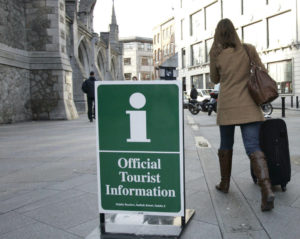Irish Tourism Industry Revival Plan launched at virtual conference

The loss of employment has been most severe in rural areas, especially along the western seaboard from Waterford to Donegal and amongst the younger age cohorts.
The virtual conference – Leading the Tourism Recovery – was organised by the Irish Tourism Industry Confederation and included contributions from Minister Catherine Martin TD, Professor Luke O’Neill, ITIC Chairperson Ruth Andrews and International Air Transport Association’s Willie Walsh amongst others.
The Revival Plan sets out 27 policy recommendations across the areas of survival, revival and sustainable recovery – and it outlines three scenarios for the future, the most optimistic of which has Irish tourism recover to 2019 levels of revenue, jobs and volume by 2025.
While tourism and hospitality are undoubtedly the hardest-hit sectors of the Irish economy during the pandemic it’s clear that urgent measures need to be taken in order to ensure that these are not among the last to reopen and recover post pandemic.
Covid supports vital
It’s equally clear that the introduction of Covid-19 financial support schemes by Government have staved-off widespread business failures and bankruptcies in the tourism and hospitality sector.
According to the ITIC, “Official data shows that those working in the tourism, hospitality, arts and entertainment sectors have become most dependent on the PUP and EWSS supports to protect income, with more than two-thirds (68.9%) of tourism businesses availing of a state employment-related support at least once between March and September. Over two out of every three ‘Accommodation and Food Services’ businesses relied on state support to sustain employment, as did more than half (54.1%) of enterprises engaged in the Cultural and Creative sector. The loss of employment has been most severe in rural areas, especially along the western seaboard from Waterford to Donegal and amongst the younger age cohorts.
“While the total number of PUP recipients across the economy has fallen by a fifth from the peak in early May, dependency level in tourism and hospitality has remained intractably high due to continued restrictions on trading.
“The importance of the Employment Wage Subsidy Scheme is vital for Irish tourism and hospitality businesses providing a much-needed mechanism to retain experienced human capital.
“With demand set to be so low for the rest of 2021 the EWSS needs to be extended for the full calendar year for tourism-related businesses.
“All sectors project an immediate decline in the number of enterprises and/or capacity as a result of Covid-19 with pubs, restaurants, hotels and B&Bs particularly hard hit, with more marginal declines across most other sectors including car and coach hire, incoming tour operators and attractions. Regrettably, more businesses may not re-open, while many face an uncertain future with an increased debt burden threatening their viability and severely limiting their investment capacity.”
Domestic market rebound in Q3
With the lifting of travel restrictions in Quarter 3 of 2020, valuable cashflow was provided the hospitality business through Irish residents taking home holidays as well as visiting friends and relatives, states the ITIC report, adding, “Thus demand from the domestic market for leisure trips and visits to friends and relatives rebounded rapidly in Q3 2020 with the lifting of travel restrictions and the reopening of most hospitality businesses other than non-food serving pubs”.








